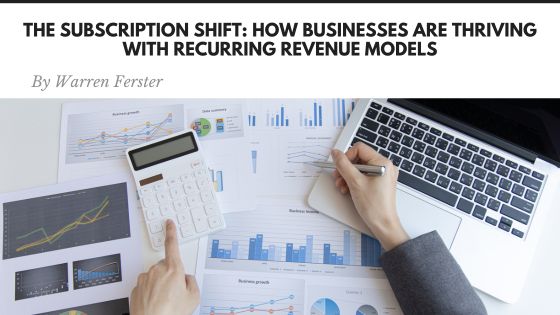The business landscape is evolving, and so are the ways companies generate revenue. One of the most impactful changes in recent years has been the widespread adoption of subscription-based models. These models offer consistent income, deeper customer relationships, and long-term growth opportunities that traditional one-time sales cannot match.
What Makes the Subscription Model So Effective
The subscription model provides a steady and predictable stream of revenue. Rather than depending on occasional purchases, businesses earn recurring income on a monthly or annual basis. This consistency allows for better financial planning and reduces the risk of cash flow issues.
For consumers, the appeal lies in convenience and access. Subscriptions often offer flexibility, lower upfront costs, and continuous updates or new offerings. From streaming services and fitness apps to meal kits and software platforms, the model delivers ongoing value that keeps customers engaged.
Building Stronger Customer Relationships
Recurring revenue models naturally encourage businesses to focus on long-term customer satisfaction. When revenue depends on retention rather than a one-time purchase, companies are motivated to provide ongoing value and maintain high service quality.
This shift in mindset promotes a customer-centric approach. Businesses must consistently engage users, address feedback, and improve offerings to keep subscribers happy. This focus on experience builds loyalty and turns users into long-term brand advocates.
Expanding Across Industries
The subscription model is no longer limited to digital services. Physical products like razors, snacks, vitamins, and even clothing are now being delivered through subscription plans. Industries that once operated solely on one-time sales are finding success with recurring offerings.
Software companies have also embraced this shift. Instead of selling perpetual licenses, many now offer software as a service. This not only ensures recurring revenue but also allows for continuous improvements, regular updates, and faster customer support.
Data and Personalization at Scale
Subscriptions offer a unique advantage when it comes to customer data. By maintaining ongoing relationships, businesses can collect valuable insights into user behavior, preferences, and usage patterns. This data enables companies to personalize content, improve services, and make informed business decisions.
Personalization helps create a stronger emotional connection with the brand, increasing the likelihood of renewal and upsell opportunities. When customers feel understood and valued, they are more likely to stay subscribed.
Challenges to Consider
While the subscription model offers many benefits, it also comes with challenges. Customer churn, or the rate at which subscribers cancel, can significantly impact revenue. Businesses must monitor churn closely and invest in strategies to increase retention.
Additionally, acquiring subscribers often requires upfront investment in marketing and onboarding. Success depends on delivering clear value quickly and maintaining it consistently over time.
A Model for Long Term Growth
The subscription shift is not just a passing trend—it is a strategic response to changing consumer expectations and market dynamics. Businesses that embrace recurring revenue models are better positioned to build resilience, deepen customer relationships, and drive sustainable growth.
In a world where adaptability and consistency are key, the subscription model offers a powerful framework for long-term success.

